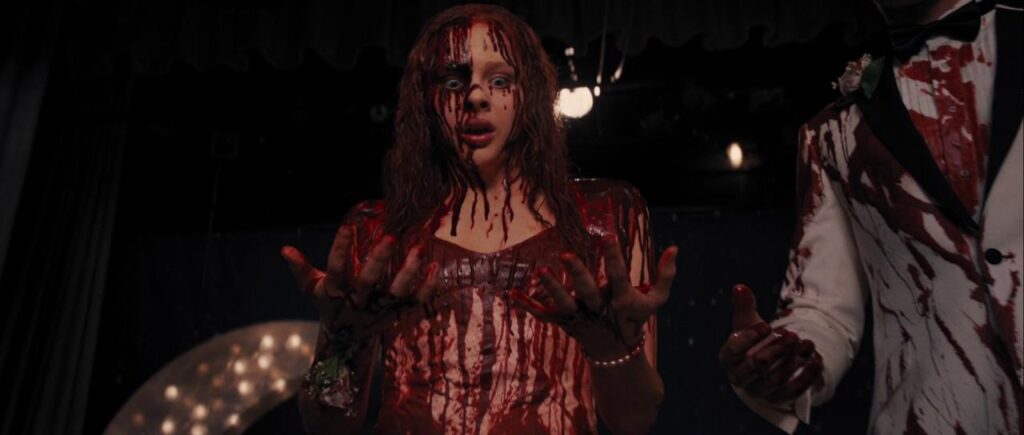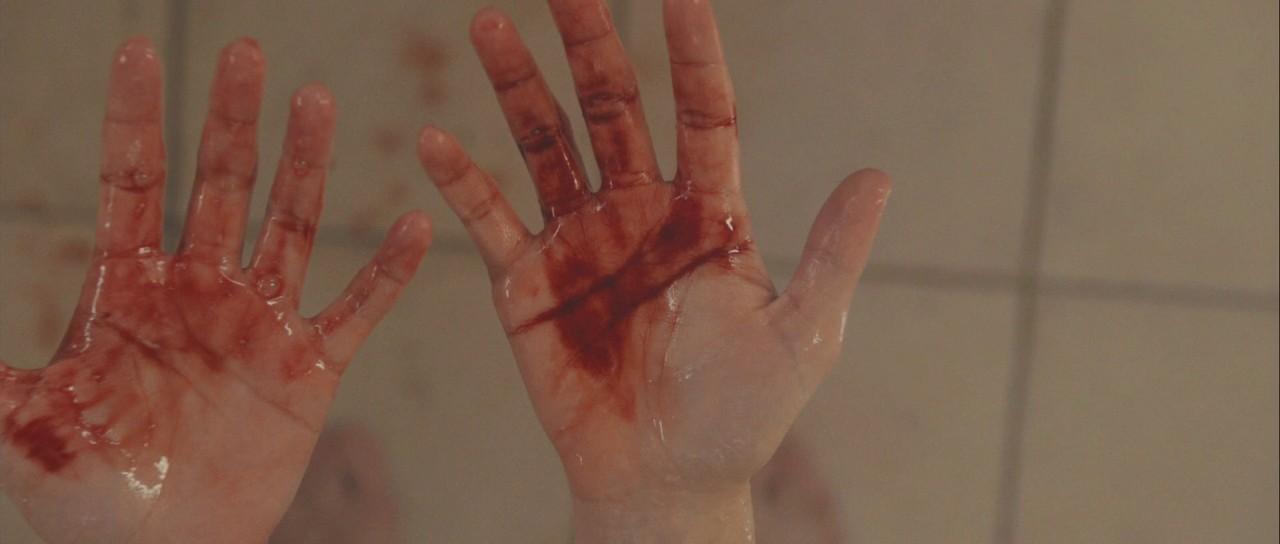
Carrie White isn’t some mystical horror queen with godlike powers. She’s a teenage girl who was pushed off the edge. Slowly. Deliberately. Over years. Until one night, drenched in pig’s blood under a disco ball, she finally broke.
What happens in Carrie, whether you read the 1974 novel, watched the De Palma classic, or even the more recent remakes, isn’t a supernatural horror story with a final girl and a big bad. No. It’s something colder. Something sadder. It’s about abuse, trauma, social isolation, and what the human mind does when it gets cornered and has no escape hatch.
So let’s sit with her for a bit. Let’s talk about Carrie, not as a monster, but as a kid who never stood a chance.
Born to Burn: Childhood Trauma 101
Carrie’s first crime was being born to Margaret White, a religious zealot who saw her child as sin incarnate. And I mean that literally, Margaret believed sex was evil and childbirth was a punishment. So from day one, Carrie wasn’t just unwanted. She was feared by her own mother.
Psychologically, that does something deep. Children of abusive or narcissistic parents often form what’s called complex trauma, or C-PTSD. It’s not about one single event, it’s about long term exposure to emotional and sometimes physical abuse. And Carrie had that in spades.
Margaret used religion not as comfort but as a weapon. Every mistake Carrie made, every natural thing she felt, whether it was curiosity, anger, even her first period, was framed as demonic. Unholy. Deserving of shame and pain.
That’s not discipline. That’s programming. You grow up like that, and your brain learns one thing: you’re the problem.
Puberty as Apocalypse
Let’s talk about that scene. The one that always shows up in every adaptation.
Carrie in the school shower, screaming bloody murder because she’s bleeding and doesn’t know what’s happening to her. And instead of compassion, what does she get? Laughter. Tampons thrown at her. “Plug it up” chanted like a war song.
You could say it’s a classic horror moment. But strip away the score and the slow motion, and what you’ve got is the most realistic scene in the entire movie.
This is humiliation trauma. One of the strongest, most destabilizing forms of emotional pain. And it’s amplified because Carrie’s already fragile. She hasn’t been taught what’s normal. She’s been told her body is a curse. And now she’s the center of attention, for the worst reason.
That moment is ground zero for Carrie’s breakdown. From a psychological lens, it’s where the shame becomes unbearable. It’s the “I can’t take this anymore” switch.
We all have one.

The Psychology of Loneliness (and Why It’s a Killer)
Carrie isn’t just bullied, she’s isolated. At home, at school, in her own body.
She has no safe space. No person she can truly trust. And when you’re that alone, your brain rewires. Social neuroscience shows us that chronic loneliness triggers the same brain regions as physical pain. It’s not just “feeling sad.” It’s torture.
The irony? Humans are hardwired to connect. We need community like we need air. Carrie’s mind is starving for belonging, but every attempt ends in shame.
Even when someone reaches out, like Sue Snell trying to make amends by having Tommy take her to prom. Carrie doesn’t know how to process it. She’s suspicious. Hesitant. Hopeful. Terrified. Because when you’ve lived in fear your whole life, even kindness feels like a trap.
She walks into that gym hoping, for once, that she might be okay.
Prom Night: A Psyche Shattered
The pig’s blood. The laughter. The silence before the storm.
It’s not just a prank gone wrong. It’s a reenactment of the shower scene, just on a bigger, meaner stage. And this time, Carrie’s not confused. She’s crushed. She knew it. She should’ve known it. That voice in her head, her mother’s voice, was right.
“They’re all gonna laugh at you.”
That’s not just a line. That’s internalized abuse. Carrie doesn’t just see the crowd laughing, she hears her mother’s words echoing. It’s dissociation. It’s trauma flooding back in, full force.
And then she snaps.
When Carrie uses her powers to destroy the gym, she’s not acting out of cold-blooded revenge. She’s in a dissociative state. Her sense of self has collapsed. She’s not Carrie White anymore. She’s what psychologists would call a trauma avatar, a person who’s lost all sense of control and becomes a vessel for their pain.
It’s not about rage. It’s about finally letting go.


Telekinesis As Metaphor: The Mind Fighting Back
Let’s not get too hung up on the whole powers thing.
Yes, Carrie has telekinesis. But if you zoom out, it functions almost like a metaphor for repressed emotion. Think about it: her powers show up right as puberty begins. They strengthen when her emotions get out of control. They become deadly when she’s pushed too far.
In a way, her powers are her mind’s last line of defense.
So when people talk about Carrie as a “monster,” I don’t buy it. Her mind did exactly what it was designed to do: protect her. Even if it came at a cost. Even if it was too late.
Her breakdown wasn’t some supernatural curse. It was trauma made visible. Emotional wounds made physical. If her powers are scary, it’s only because pain, real pain, is scary to look at.
Could You Be Carrie?
Here’s the thing nobody wants to admit: there’s a little bit of Carrie in all of us.
We all know what it’s like to feel small. To be humiliated. To crave love and get betrayal instead. Carrie didn’t become dangerous because she had powers. She became dangerous because no one helped her when it mattered.
So the next time someone tells you Carrie’s a villain? Ask them this: how many times does someone have to be pushed before they stop being human?
Carrie didn’t start a war. She was born into one.
And she lost.



